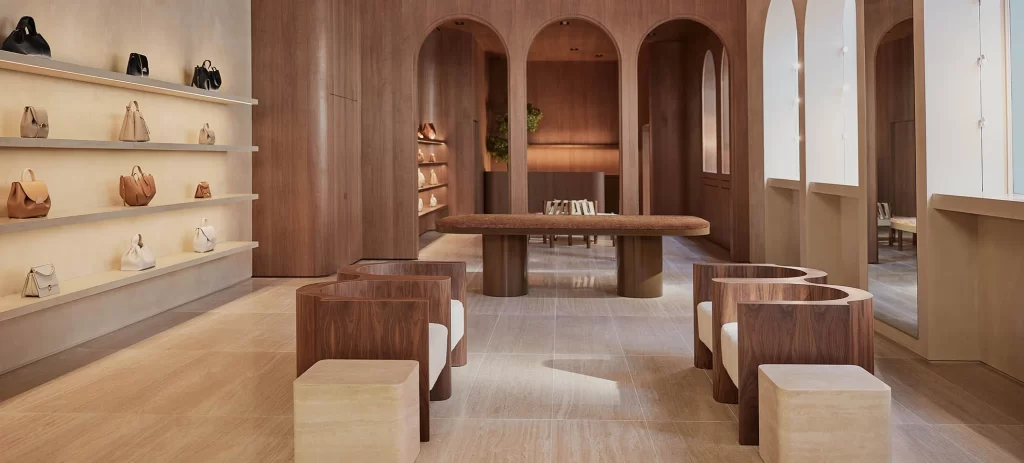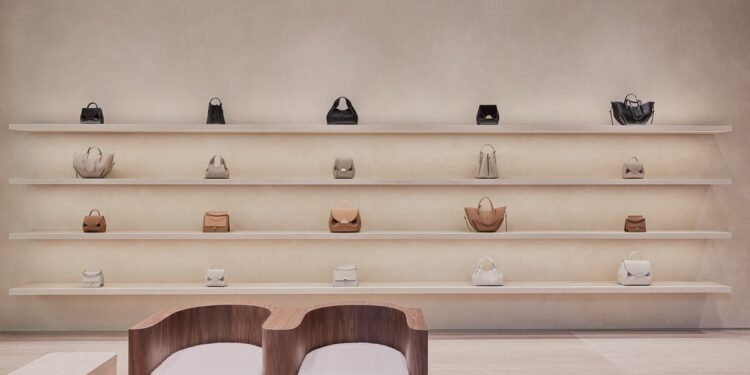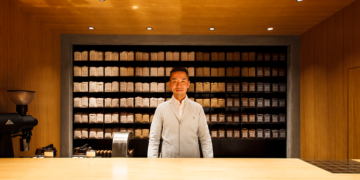The Human Touch: How Contemporary Craftsmanship is Redefining Luxury
Luxury, once defined by grand logos and opulence, is being reimagined. Today’s consumers are turning away from mass production and branding excess in favor of a quieter, more intimate kind of luxury—one rooted in craftsmanship, sustainability, and personal connection. Smaller handbag brands like Polène, Manu Atelier, and Bennett Winch are gaining ground in this new era, proving that true luxury lies in the human touch.
A Shift in Consumer Values
The global luxury market is undergoing a seismic shift. According to the 2024 True-Luxury Global Consumer Insight report by BCG, over 60% of consumers are drawn to brands that offer authenticity, unique designs, and superior craftsmanship. This marks a departure from traditional notions of luxury, where exclusivity and price reigned supreme. Now, the focus is on meaning and value—qualities that smaller, artisan-led brands are uniquely positioned to deliver.
Polène exemplifies this philosophy. Established in 2016 by siblings Elsa, Antoine, and Mathieu Mothay—descendants of the founders of the iconic Normandy label Saint James—the Parisian handbag brand has gained acclaim for its understated elegance and impeccable craftsmanship. Each bag is meticulously handcrafted in Ubrique, Spain, a town celebrated for its leather working traditions, using premium Spanish or Italian calfskin. Loewe also makes many of its hide accessories near by. The process, from initial sketch to finished product, spans at least 18 months and involves a team of 2,000 artisans—a significant evolution from the 10 artisans Polène started with less than a decade ago. This deliberate, small-batch approach ensures exceptional quality while imbuing each product with a deeply personal touch, with prices ranging from $330 to $520.
“Customers feel they are investing in something personal and less mass-produced,” says Merve Manastir, co-founder of Manu Atelier. It’s a sentiment echoed by Polène’s loyal following, who value the brand’s commitment to thoughtful design and sustainability.
Craftsmanship as a Competitive Edge
The rise of smaller brands like Polène reflects a growing consumer desire for products that tell a story—items rich in meaning, care, and authenticity. Each Polène bag, from the best-selling Numéro Un (left) to the elegant Numéro Dix (right), represents hours of meticulous work by skilled artisans. This level of craftsmanship is more than a testament to the brand’s dedication to quality; it’s a defining characteristic that sets Polène apart in a market increasingly dominated by automation, scale, and fleeting trends (so-called fast fashion).


Polène’s commitment to quality extends beyond its designs to its entire production philosophy. Unlike larger luxury houses that churn out expansive seasonal collections to chase the latest trends, Polène takes a measured, intentional approach. Its product lineup is deliberately restrained, featuring just 13 core models that prioritize timeless design over transience. This “less is more” philosophy allows the brand to focus on perfecting every detail from the careful selection of Spanish and Italian calfskin to the flawless stitching that gives each bag its distinctive character.
In a market where speed often overshadows quality, Polène’s approach positions it as a leader in the slow luxury movement. This deliberate pace resonates deeply with consumers and reinforces Polène’s identity as a brand devoted to its craft. By valuing patience and artistry over scale, Polène has carved out a niche that larger, trend-driven luxury brands struggle to emulate. It’s a reminder that, in the race for innovation, the most enduring competitive edge often lies in taking the time to get it right.
The Market Backs the Small Players
This focus on craftsmanship is paying off, as investors increasingly recognize the potential of smaller, artisan-led brands in the contemporary luxury market. The handbag sector, once dominated by heritage brands (Chanel, Louis Vuitton, Hermes), has emerged as a major growth area for nimble players that cater to shifting consumer preferences. Bernard Arnault’s private equity firm, L Catterton, recently acquired a minority stake in Polène—a move that reflects growing confidence in the scalability of boutique brands with authentic stories and differentiated offerings.
This investment arrives at a pivotal time for the luxury sector. LVMH, the world’s largest luxury conglomerate, reported a 5% revenue decline in Q3 2024—the first drop in years. This downturn underscores a broader trend: consumers are gravitating toward brands that combine affordability with authenticity and craftsmanship. Polène, with its meticulously handcrafted products and accessible price points, fits neatly into this new paradigm, and L Catterton’s backing signals an appetite for brands that disrupt traditional luxury hierarchies.
The confidence in smaller players like Polène isn’t an isolated phenomenon. Private equity firms and venture capitalists are increasingly exploring opportunities in niche luxury markets, particularly those that align with consumer demands for sustainability and ethical production. L Catterton’s portfolio also includes stakes in other rising stars like Ganni, Birkenstock, and Gentle Monster—brands that, like Polène, embody a contemporary take on luxury that feels approachable and personal. These investments reflect a shift in strategy among investors, who are moving away from legacy labels and toward brands that are agile, innovative, and capable of forging deeper connections with their audiences.
Why Small Players Attract Big Investors
Smaller brands like Polène offer a unique value proposition to investors. First, their direct-to-consumer (DTC) strategies provide higher profit margins by cutting out traditional retail middlemen. By controlling their sales channels, these brands can create personalized customer experiences while gathering valuable consumer data to inform their growth strategies. Polène’s decision to expand its brick-and-mortar footprint into cities like London, Copenhagen, and Hamburg is a testament to this approach, blending the efficiency of DTC with the tactile appeal of in-store shopping.
Second, artisan-led brands are highly adaptable, enabling them to respond to market trends faster than larger, more bureaucratic competitors. Polène, for instance, has been able to introduce sustainable practices—such as using leftover materials for bag linings—without the delays or logistical challenges that often hinder bigger players. This agility not only appeals to eco-conscious consumers but also positions these brands as leaders in the increasingly critical area of sustainable luxury.
Finally, smaller brands often possess a strong brand identity and loyal customer base, making them attractive to investors seeking high-growth potential. Polène’s restrained product lineup and focus on timeless, minimalist designs have cultivated a dedicated following, particularly among younger consumers who value quality and authenticity over flashy logos. This level of brand loyalty is a key factor in attracting investment, as it ensures a steady stream of revenue and reduces dependency on seasonal trends.
Sustainability as a Core Value
Beyond craftsmanship, sustainability has emerged as a cornerstone of modern consumer values, significantly influencing the success of smaller brands. Polène exemplifies this shift by using leftover materials for bag linings, embracing small-batch production to minimize waste, and implementing thoughtful practices that reduce their environmental footprint. These efforts represent a stark contrast to the wastefulness and overproduction often associated with fast fashion, which has drawn criticism for its environmental and social costs.
This conscious approach to production resonates deeply with a growing segment of consumers who demand more transparency and accountability from the brands they support. BCG’s 2024 Consumer Insight Report reveals that 73% of luxury consumers now view a brand’s commitment to sustainability as a non-negotiable element of its integrity. For Polène, sustainability is not an afterthought but an intrinsic part of its design philosophy, seamlessly integrated into its processes.
By embedding sustainability into its DNA, Polène positions itself as a leader in ethical luxury. Its practices not only appeal to environmentally conscious consumers but also create a meaningful narrative that strengthens customer loyalty. This agility and alignment with modern values give Polène a competitive edge over larger, more traditional luxury brands that are often burdened by legacy systems and slower to adopt sustainable practices. In doing so, Polène sets a compelling example of how small, innovative brands can redefine industry standards and lead the charge toward a more sustainable future.
The Rise of Human-Centered Luxury
What sets these smaller brands apart is their ability to make luxury feel personal. Polène’s boutiques, designed by Paris based architect, Valériane Lazard, provide an intimate shopping experience that mirrors the brand’s ethos of understated elegance. Every detail—from the warm, minimalist interiors to the all-beige uniforms of its staff—is designed to create a connection between the product and the consumer.

This human-centered approach is redefining what luxury means. As Jean Touitou, founder of APC, observes: “People want to buy less but go back to quality and durability.” Smaller brands are uniquely equipped to meet this demand, offering products that reflect care, craftsmanship, and authenticity.
Bennett Winch, another rising player in the luxury landscape, exemplifies this philosophy with its made-to-last weekender bags and briefcases, guided by a simple ethos: “buy well and you need only buy once.” Its Savile Row heritage, free lifetime repairs, and focus on quality resonate with customers who value durability and ethical practices over disposable fashion. These brands are not only delivering high-quality products but also fostering trust and loyalty by aligning with consumer beliefs.

A New Landscape for Luxury
The rise of smaller brands like Polène marks a turning point in the luxury market. As consumers shift their focus to values like sustainability, craftsmanship, and storytelling, these agile players are carving out a significant share of the market. They offer not just products but a vision of what modern luxury can be—personal, ethical, and deeply human.
Yet this movement is not solely about affordability or practicality; it reflects a broader disconnection from conglomerate-driven luxury. As Robin Winch, co-founder of Bennett Winch, explains: “Many of our customers could afford big names but their purchases are driven by their beliefs: they have become disconnected from conglomerates.” This sentiment underscores the growing demand for brands that align with personal values, offering a genuine alternative in a crowded market.
For Polène, Bennett Winch, and other independent brands, the future is bright. By staying true to their roots while embracing innovation, these brands are proving that the human touch isn’t just a selling point—it’s the future of luxury itself. As they redefine handbag economics and shift industry standards, they are creating a blueprint for what sustainable and meaningful luxury can look like in the years to come.









